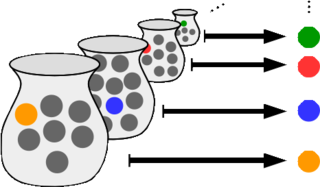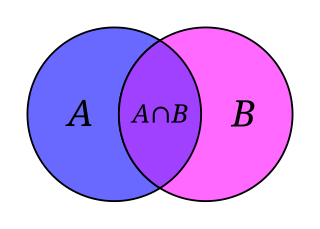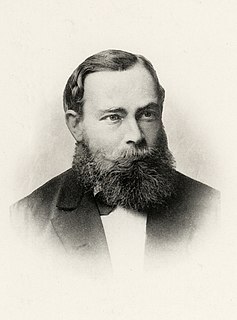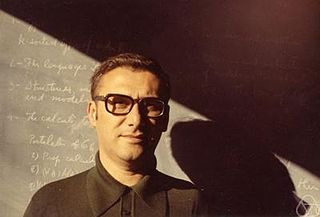Related Research Articles

In mathematics, the axiom of choice, or AC, is an axiom of set theory equivalent to the statement that a Cartesian product of a collection of non-empty sets is non-empty. Informally put, the axiom of choice says that given any collection of bins, each containing at least one object, it is possible to make a selection of exactly one object from each bin, even if the collection is infinite. Formally, it states that for every indexed family of nonempty sets there exists an indexed family of elements such that for every . The axiom of choice was formulated in 1904 by Ernst Zermelo in order to formalize his proof of the well-ordering theorem.
In the philosophy of mathematics, intuitionism, or neointuitionism, is an approach where mathematics is considered to be purely the result of the constructive mental activity of humans rather than the discovery of fundamental principles claimed to exist in an objective reality. That is, logic and mathematics are not considered analytic activities wherein deep properties of objective reality are revealed and applied but are instead considered the application of internally consistent methods used to realize more complex mental constructs, regardless of their possible independent existence in an objective reality.
Mathematical logic is a subfield of mathematics exploring the applications of formal logic to mathematics. It bears close connections to metamathematics, the foundations of mathematics, and theoretical computer science. The unifying themes in mathematical logic include the study of the expressive power of formal systems and the deductive power of formal proof systems.
In the philosophy of mathematics, constructivism asserts that it is necessary to find a mathematical object to prove that it exists. In classical mathematics, one can prove the existence of a mathematical object without "finding" that object explicitly, by assuming its non-existence and then deriving a contradiction from that assumption. This proof by contradiction is not constructively valid. The constructive viewpoint involves a verificational interpretation of the existential quantifier, which is at odds with its classical interpretation.

Set theory is a branch of mathematical logic that studies sets, which informally are collections of objects. Although any type of object can be collected into a set, set theory is applied most often to objects that are relevant to mathematics. The language of set theory can be used to define nearly all mathematical objects.

Willard Van Orman Quine was an American philosopher and logician in the analytic tradition, recognized as "one of the most influential philosophers of the twentieth century." From 1930 until his death 70 years later, Quine was continually affiliated with Harvard University in one way or another, first as a student, then as a professor of philosophy and a teacher of logic and set theory, and finally as a professor emeritus who published or revised several books in retirement. He filled the Edgar Pierce Chair of Philosophy at Harvard from 1956 to 1978. A 2009 poll conducted among analytic philosophers named Quine as the fifth most important philosopher of the past two centuries. He won the first Schock Prize in Logic and Philosophy in 1993 for "his systematical and penetrating discussions of how learning of language and communication are based on socially available evidence and of the consequences of this for theories on knowledge and linguistic meaning." In 1996 he was awarded the Kyoto Prize in Arts and Philosophy for his "outstanding contributions to the progress of philosophy in the 20th century by proposing numerous theories based on keen insights in logic, epistemology, philosophy of science and philosophy of language."
The philosophy of mathematics is the branch of philosophy that studies the assumptions, foundations, and implications of mathematics. It aims to understand the nature and methods of mathematics, and finding out the place of mathematics in people's lives. The logical and structural nature of mathematics itself makes this study both broad and unique among its philosophical counterparts.

Friedrich Ludwig Gottlob Frege was a German philosopher, logician, and mathematician. He worked as a mathematics professor at the University of Jena, and is understood by many to be the father of analytic philosophy, concentrating on the philosophy of language, logic, and mathematics. Though largely ignored during his lifetime, Giuseppe Peano (1858–1932) and Bertrand Russell (1872–1970) introduced his work to later generations of philosophers.
Classical logic is the intensively studied and most widely used class of logics. Classical logic has had much influence on analytic philosophy, the type of philosophy most often found in the English-speaking world.
In the philosophy of mathematics, ultrafinitism is a form of finitism. There are various philosophies of mathematics that are called ultrafinitism. A major identifying property common among most of these philosophies is their objections to totality of number theoretic functions like exponentiation over natural numbers.
Foundations of mathematics is the study of the philosophical and logical and/or algorithmic basis of mathematics, or, in a broader sense, the mathematical investigation of what underlies the philosophical theories concerning the nature of mathematics. In this latter sense, the distinction between foundations of mathematics and philosophy of mathematics turns out to be quite vague. Foundations of mathematics can be conceived as the study of the basic mathematical concepts and how they form hierarchies of more complex structures and concepts, especially the fundamentally important structures that form the language of mathematics also called metamathematical concepts, with an eye to the philosophical aspects and the unity of mathematics. The search for foundations of mathematics is a central question of the philosophy of mathematics; the abstract nature of mathematical objects presents special philosophical challenges.
Proof theory is a major branch of mathematical logic that represents proofs as formal mathematical objects, facilitating their analysis by mathematical techniques. Proofs are typically presented as inductively-defined data structures such as plain lists, boxed lists, or trees, which are constructed according to the axioms and rules of inference of the logical system. As such, proof theory is syntactic in nature, in contrast to model theory, which is semantic in nature.
In mathematics, constructive analysis is mathematical analysis done according to some principles of constructive mathematics. This contrasts with classical analysis, which simply means analysis done according to the principles of classical mathematics.
Errett Albert Bishop was an American mathematician known for his work on analysis. He expanded constructive analysis in his 1967 Foundations of Constructive Analysis, where he proved most of the important theorems in real analysis by constructive methods.

Newton Carneiro Affonso da Costa is a Brazilian mathematician, logician, and philosopher. He studied engineering and mathematics at the Federal University of Paraná in Curitiba and the title of his 1961 Ph.D. dissertation was Topological spaces and continuous functions.
Constructive set theory is an approach to mathematical constructivism following the program of axiomatic set theory. That is, it uses the usual first-order language of classical set theory. Although of course the logic is constructive, there is no explicit use of constructive types. Rather, there are just sets, thus it can look very much like classical mathematics done on the most common foundations, namely the Zermelo–Fraenkel axioms (ZFC).
Non-standard analysis and its offshoot, non-standard calculus, have been criticized by several authors, notably Errett Bishop, Paul Halmos, and Alain Connes. These criticisms are analyzed below.
John Lane Bell is a Canadian philosopher and logician. He is Professor of Philosophy at the University of Western Ontario in Canada. He has made contributions to mathematical logic and philosophy, and is the author of a number of books. His research includes such topics as set theory, model theory, lattice theory, modal logic, quantum logic, constructive mathematics, type theory, topos theory, infinitesimal analysis, spacetime theory, and the philosophy of mathematics. He is the author of more than 70 articles and of 11 books. In 2009, he was elected a Fellow of the Royal Society of Canada.
Univalent foundations are an approach to the foundations of mathematics in which mathematical structures are built out of objects called types. Types in univalent foundations do not correspond exactly to anything in set-theoretic foundations, but they may be thought of as spaces, with equal types corresponding to homotopy equivalent spaces and with equal elements of a type corresponding to points of a space connected by a path. Univalent foundations are inspired both by the old Platonic ideas of Hermann Grassmann and Georg Cantor and by "categorical" mathematics in the style of Alexander Grothendieck. Univalent foundations depart from the use of classical predicate logic as the underlying formal deduction system, replacing it, at the moment, with a version of Martin-Löf type theory. The development of univalent foundations is closely related to the development of homotopy type theory.

Logic is the systematic study of the form of valid inference, and the most general laws of truth. A valid inference is one where there is a specific relation of logical support between the assumptions of the inference and its conclusion. In ordinary discourse, inferences may be signified by words such as therefore, thus, hence, ergo, and so on.
References
- ↑ Stewart Shapiro, ed. (2005). The Oxford Handbook of Philosophy of Mathematics and Logic. Oxford University Press, USA. ISBN 978-0-19-514877-0.
- ↑ Torkel Franzén (1987). Provability and Truth. Almqvist & Wiksell International. ISBN 91-22-01158-7.
| This mathematical logic-related article is a stub. You can help Wikipedia by expanding it. |